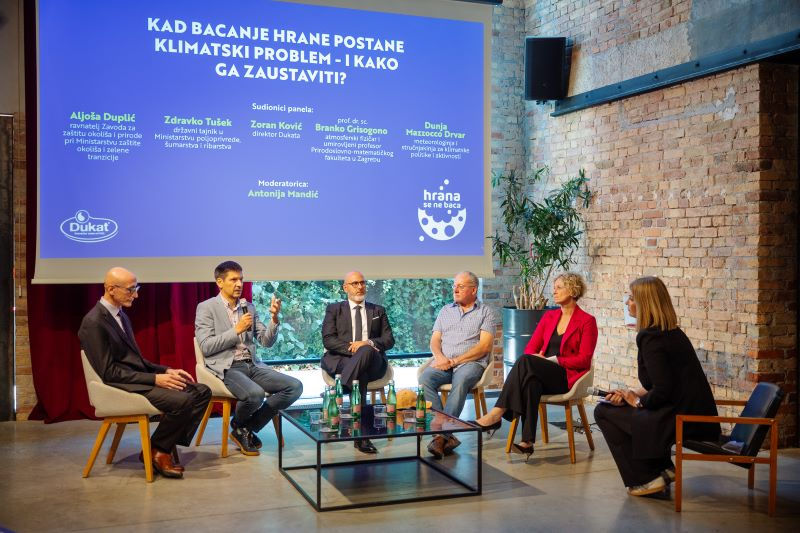The Harm of Food Waste
- Tomislav Radić

- Sep 13, 2025
- 3 min read
A survey carried out in June 2025 by the agency Improve Research & Analytics for Dukat’s project “Food is not to be wasted” has revealed the urgent need to raise greater public awareness of the impact of food waste on climate change. Almost two-thirds of citizens in Croatia throw food away, with over one million people doing so regularly – once a week or more. In this way, they directly contribute to greenhouse gas emissions, which accelerate global warming and trigger climate change.

The results were presented at a panel discussion entitled “When food waste becomes a climate problem – and how to stop it”. Participants included Aljoša Duplić, Director of the Institute for Nature and Environmental Protection at the Ministry of Environmental Protection and Green Transition; Zdravko Tušek, State Secretary at the Ministry of Agriculture, Forestry and Fisheries; atmospheric physicist Dr Branko Grisogono; meteorologist and climate policy expert Dunja Mazzocco Drvar; and Dukat’s Director, Zoran Ković.

The findings show that 74% of citizens are aware of climate change and the influence of human activities upon it. However, only 39% can explain the link between food waste and climate change, and a mere 5% perceive food waste as an environmental problem. Furthermore, 66% of citizens say they are concerned about the issue of food waste, and an overwhelming 64% cite excessive amounts of prepared food as the main reason for throwing food away. Nevertheless, there are positive developments: compared with 2023, when Dukat carried out its first survey on food waste within this project, food waste in the category of milk and dairy products has decreased by as much as 11 percentage points. This progress is surely due, at least in part, to citizens’ increased awareness raised through the project, which for two years has been implementing a series of initiatives to promote more responsible attitudes towards food in everyday life.

“Food waste contributes significantly to the production of greenhouse gases and climate change. At the same time, reducing food waste is one of the quickest, simplest, and cheapest ways to cut emissions – with a concrete and measurable effect on the environment. We are encouraged by the fact that raising awareness delivers results: food waste in the dairy category has fallen by as much as 11 percentage points compared with 2023, which makes us especially proud,” said Dukat’s Director, Zoran Ković. “I believe that all motives for climate-responsible behaviour – whether ethical, moral, financial, or rooted in personal awareness – are equally valuable because all bring positive outcomes. Systematic education is essential, particularly among younger generations, so that they understand that food waste produces more harmful emissions than, for instance, air and sea transport,” added meteorologist and climate policy expert Dunja Mazzocco Drvar.

“Every kilogram of waste is too much – ethically, ecologically, and socio-economically. The Ministries of Agriculture and of Environmental Protection are implementing research and measures to reduce waste, from educating children and the public to establishing nine food banks and equipping intermediaries for donations. In this way, around 2,000 tonnes of surplus food have been redirected to useful purposes,” stated Zdravko Tušek, State Secretary at the Ministry of Agriculture, Forestry and Fisheries. “The EU’s food waste reduction targets set for 2030 are ambitious but achievable, provided stronger institutional measures and extended producer responsibility accompany consumer responsibility. The trend of reduced food waste between 2010 and 2022, along with this most recent positive data, is encouraging – but much work still lies ahead,” stressed Aljoša Duplić, Director of the Institute for Nature and Environmental Protection.

“The climate crisis is already hovering between yellow and red alert. Globally, too little is being done, while Croatia is suffering the consequences in the form of droughts and rising sea levels. Solutions must be systemic – from education and regulation to food and energy production, with energy at the very heart of climate change. The longer we delay decisive action, the harder and more expensive the solutions will be,” concluded atmospheric physicist Dr Branko Grisogono.
The value of the project “Food is not to be wasted” has been recognised by the Ministry of Environmental Protection and Green Transition, the Ministry of Agriculture, Forestry and Fisheries, and the Ministry of Science, Education and Youth, which also serve as project patrons. Over the past two years, the project has systematically raised awareness among citizens of the importance of reducing food waste in daily life. From 2025 onwards, the project has placed additional emphasis on the impact of food waste on climate change, in order to further motivate citizens towards a more responsible relationship with food – and with our planet.





Comments